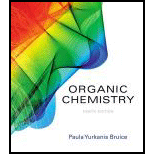
Organic Chemistry (8th Edition)
8th Edition
ISBN: 9780134042282
Author: Paula Yurkanis Bruice
Publisher: PEARSON
expand_more
expand_more
format_list_bulleted
Question
Chapter 22.13, Problem 26P
Interpretation Introduction
Interpretation: The side chain of amino acid that can form an imine with the substrate has to be identified.
Concept introduction:
- Enzyme is a protein that is a biological catalyst. The reactant in a reaction catalyzed by the enzyme is called substrate. In the enzyme, a pocket like cleft is present called active site where it binds the substrate.
- Some amino acid chains in the enzyme act as base, acid and nucleophilic catalyst. Many of the enzymes contain metal ions at the active site which acts as catalyst.
- Acid Catalyst helps in increasing the rate of a particular reaction by the donation of a proton to substrate.
- Base Catalyst helps in increasing the rate of a particular reaction by the removal of a proton to substrate.
- Nucleophilic catalysis helps in increasing the rate of a particular reaction by the formation of a covalent bond with substrate
Expert Solution & Answer
Want to see the full answer?
Check out a sample textbook solution
Students have asked these similar questions
Which of the following amino acid side chains can form an imine with a substrate?
Which of the following amines can be used to resolve a racemic mixture of amino acids?
The hydrolysis of an ester can be sped up by both acidic and basic conditions. Aminolysis of an ester can be sped up by acidic conditions, but not by basic conditions. Explain why.
Chapter 22 Solutions
Organic Chemistry (8th Edition)
Ch. 22.2 - Compare each of the mechanisms listed here with...Ch. 22.2 - Prob. 3PCh. 22.2 - Prob. 4PCh. 22.3 - a. Draw the mechanism for the following reaction...Ch. 22.5 - Prob. 7PCh. 22.5 - Propose a mechanism for the Co2+ catalyzed...Ch. 22.6 - Prob. 9PCh. 22.7 - Prob. 10PCh. 22.7 - Prob. 12PCh. 22.7 - Prob. 13P
Ch. 22.9 - Which of the following amino acid side chains can...Ch. 22.9 - Which of the following C-terminal peptide bonds is...Ch. 22.9 - Carboxypeptidase A has esterase activity as well...Ch. 22.10 - Arginine and lysine side chains fit into trypsins...Ch. 22.10 - Explain why serine proteases do not catalyze...Ch. 22.11 - If H2 18O is used in the hydrolysis reaction...Ch. 22.11 - Draw the pH-activity profile for an enzyme that...Ch. 22.12 - The pHactivity profile for glucose-6-phosphate...Ch. 22.12 - Prob. 23PCh. 22.13 - Draw the mechanism for the hydroxide ion-catalyzed...Ch. 22.13 - What advantage does the enzyme gain by forming an...Ch. 22.13 - Prob. 26PCh. 22.13 - Prob. 27PCh. 22.13 - Aldolase shows no activity if it is incubated with...Ch. 22 - Which of the following parameters would be...Ch. 22 - Prob. 29PCh. 22 - Prob. 30PCh. 22 - Prob. 31PCh. 22 - Indicate the type of catalysis that is occurring...Ch. 22 - The deuterium kinetic isotope effect (KH2O/KD2O)...Ch. 22 - Prob. 34PCh. 22 - Co2+ catalyzes the hydrolysis of the lactam shown...Ch. 22 - there are two kinds of aldolases. Class I...Ch. 22 - Prob. 37PCh. 22 - The hydrolysis of the ester shown here is...Ch. 22 - Prob. 39PCh. 22 - At pH = 12, the rate of hydrolysis of ester A is...Ch. 22 - 2-Acetoxycyclohexyl tosylate reacts with acetate...Ch. 22 - Proof that an imine was formed between aldolase...Ch. 22 - Prob. 43PCh. 22 - a. Explain why the alkyl halide shown here reacts...Ch. 22 - Triosephosphate isomerase (TIM) catalyzes the...
Knowledge Booster
Similar questions
- Which of the attached amines can be used to resolve a racemic mixture of amino acids?arrow_forwardBased on the image attached, it shows methyl salicylate reacts with Ethanamine, and Ether act as a solvent to form N-ethylbenzamide as a product. Explains the mechanism reaction of conversion ester to an amide.arrow_forwardIn a typical amino acid zwitterion, the carboxylate end is O neutral O attached to an amine O positively charged soluble in a nonpolar solvent O negatively charged « Previousarrow_forward
- What is more reactive Astatine or Tennessine? Explainarrow_forwardWhich of the following reductive amination reactions will yield a secondary amine?arrow_forwardWhich of the following substituent is an ortho/para-directing deactivator? a amino group b halogen group c phenyl group d carboxyl grouparrow_forward
- Define Nucleophilicity Versus Basicity ?arrow_forwardWhich one will make the largest contribution to hydrophobic interactions via LDFs within the active site of an enzyme?arrow_forwardIdentify the modes of catalysis and when / why they occur• Acid-base • Covalent• Transition state stabilization• Catalysis by proximity • Catalysis by strain• Lock & key is better seen as describing substrate binding to active sitearrow_forward
- DRAW THE CHEMICAL STRUCTURE OF THE FOLLOWING:1) Methyl 5-methyl-6-oxohexanoate2) 5-Amino-3-methylpentan-2-ol3) Isopropyl 3-hydroxypropanoate4) 3-Oxocyclohexanecarbaldehyde5) 5-Methyl-6-oxohexanamide6) p-Chloromethylbenzene7) 2,5,5-Trimethyl-4-oxohept-2-enoic acidarrow_forwardThe aminolysis of acetic anhydride will produce aniline and ammonia as major products. True or Falsearrow_forwardAn aqueous solution of a primary or secondary amine reacts with an acyl chloride to form an amide as the major product. However, if the amine is tertiary, an amide is not formed. What product is formed? Explain.arrow_forward
arrow_back_ios
SEE MORE QUESTIONS
arrow_forward_ios
Recommended textbooks for you
 Organic Chemistry: A Guided InquiryChemistryISBN:9780618974122Author:Andrei StraumanisPublisher:Cengage Learning
Organic Chemistry: A Guided InquiryChemistryISBN:9780618974122Author:Andrei StraumanisPublisher:Cengage Learning Organic ChemistryChemistryISBN:9781305580350Author:William H. Brown, Brent L. Iverson, Eric Anslyn, Christopher S. FootePublisher:Cengage Learning
Organic ChemistryChemistryISBN:9781305580350Author:William H. Brown, Brent L. Iverson, Eric Anslyn, Christopher S. FootePublisher:Cengage Learning

Organic Chemistry: A Guided Inquiry
Chemistry
ISBN:9780618974122
Author:Andrei Straumanis
Publisher:Cengage Learning

Organic Chemistry
Chemistry
ISBN:9781305580350
Author:William H. Brown, Brent L. Iverson, Eric Anslyn, Christopher S. Foote
Publisher:Cengage Learning